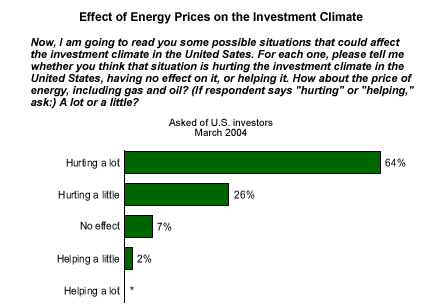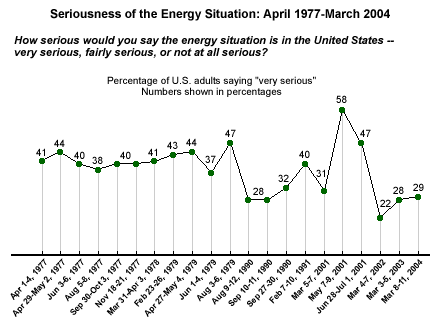On Monday, the national average price for a regular gallon of gas had reached $1.75, according to the American Automobile Association -- the highest price ever recorded. Last week, the UBS/Gallup Index of Investor Optimism survey* was released, showing that increasing energy prices are now a major investor concern. The FBI also issued warnings that Texas oil refineries could be vulnerable to terrorist attacks.
So why aren't we hearing more about the potential for another energy crisis and what it could do to the U.S. economy? Why isn't there more focus on Wednesday's OPEC meeting at which oil ministers will consider cutting oil production on April 1? And why isn't a greater effort being made to get OPEC to increase oil production?
A new Gallup Poll suggests that the current lack of political focus on surging energy prices may be due to the way the American public has reacted to recent price increases. People are nowhere near as concerned about today's soaring energy prices as they were at several points in the past: the height of the West Coast energy shortage in 2001, the 1991 Gulf War, and the 1979 energy crisis.
Will this lack of attention to energy prices continue as we approach this year's presidential elections? To the contrary, soaring energy prices might just turn out to be the stealth issue of 2004, bursting upon the political scene as the summer driving season approaches.
Investors Are Concerned About Energy Prices
Nine in 10 American investors say that the price of energy (including gas and oil) is hurting the current investment climate, according to the Index of Investor Optimism survey. Two-thirds of investors (64%) say the price of energy is hurting the investment climate a lot, and another 26% say energy prices are hurting it a little. Only 2% of investors say energy prices are helping the investment environment a little, and none say they are helping a lot. Seven percent say they are not affecting the investment climate.

But, the Public Isn't Seeing a Crisis
But despite record gas prices, only 29% of U.S. adults overall say the current energy situation is "very serious," according to Gallup's March 2004 Environment poll*. This is about the same as a year ago (28%) and in March 2001, but it is far below the 58% who said the situation was very serious in May 2001, at the height of the West Coast energy crisis.

A Repeat of the Energy Crisis in 2001
A year ago, we all thought the increase in energy prices would be temporary. The assumption was that once the war with Iraq was settled, Iraq's oil production would increase significantly. As a result, energy prices would fall even as the world economy improved. Unfortunately, that hasn't happened.
We have new record gas prices even though peak usage is months away. Although the markets will remain volatile and OPEC is not likely to cut production this week, energy prices are going to go higher during the months ahead. And, they'll go much higher if there is a refinery shut down, whether from a maintenance problem or a terrorist attack.
As a result, the public's response to the energy crisis could be very similar to that in 2001. In a couple of months, a majority of Americans may be saying that the U.S. energy situation is very serious. In this regard, investors may be looking ahead to what they think the energy situation might be like in several months when they rate energy prices as hurting the investment climate a lot.
Bottom Line
The environment is clearly a political wedge issue with 48% of Americans saying that protecting the environment should be a priority even at the risk of limiting the amount of energy supplies that the United States produces, and nearly an equal percentage -- 44% -- saying they feel that energy production should receive priority over the environment. As a result, another energy crisis would only add to the intensity of the debate as the elections approach.
I can't help wondering, however, where OPEC and the concept of a "flexible" global economy fit into the energy debate. If the United States can't do anything about outsourcing because it would significantly disrupt the global economy, then how can the American public allow OPEC -- acting as a global oligopoly -- to manipulate world energy prices?
Increased energy prices are not only a regressive and recessionary tax on the average American, but also a significant inefficiency in the world economy, at least to the degree that they aren't justified by the free market. Maybe we should focus more attention on the monopolistic pricing power of OPEC, and less on our domestic disagreements over the importance of the environment versus energy production and economic growth.
*Results are based on telephone interviews with 1,005 national adults, aged 18 and older, conducted March 8-11, 2004 and telephone interviews with 803 investors, aged 18 and older, conducted March 1-14, 2004. For results based on the total sample of national adults, one can say with 95% confidence that the margin of sampling error is ±3 percentage points. For results based on the total sample of investors, one can say with 95% confidence that the margin of sampling error is ±4 percentage points.

